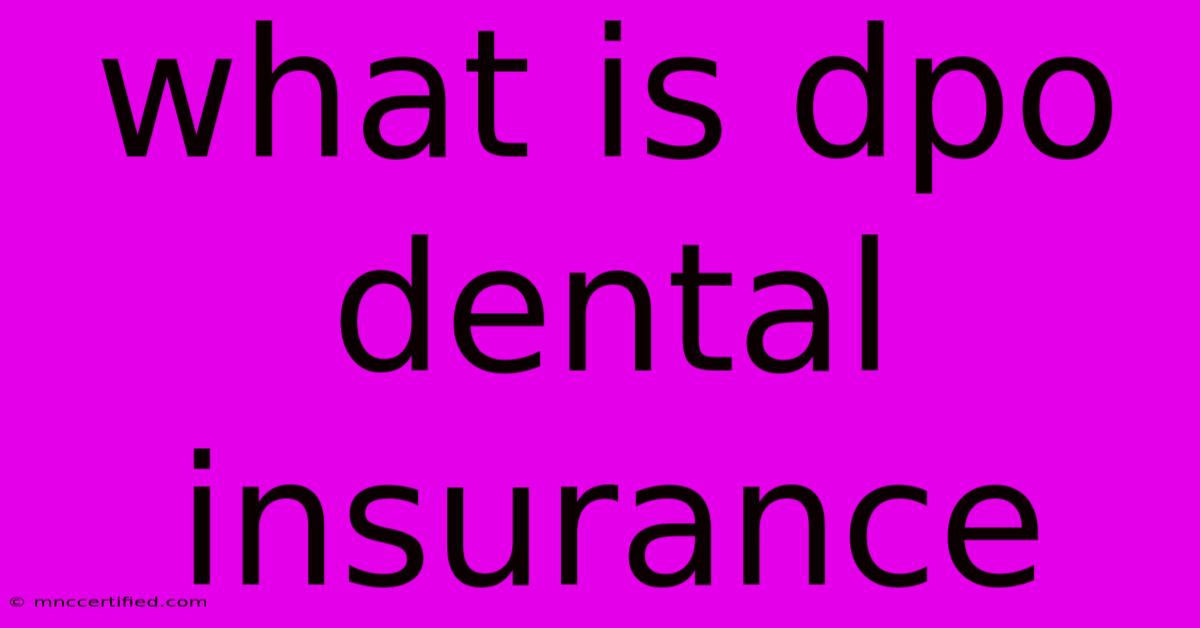What Is Dpo Dental Insurance

Table of Contents
What is DPO Dental Insurance? Understanding Your Coverage
Dental insurance can be confusing, with a myriad of plans and terms. One type you might encounter is DPO dental insurance, often referred to as Dental Provider Organization insurance. This article will break down what DPO dental insurance is, how it works, its advantages and disadvantages, and help you decide if it's the right choice for your dental needs.
Understanding the DPO Network
Unlike PPO (Preferred Provider Organization) plans which offer broader choices and higher out-of-network reimbursement, DPO plans operate with a more restricted network of dentists. This limited network is a key differentiator. You'll generally find lower premiums with a DPO plan because the insurer has negotiated lower fees with the participating dentists within the network. Choosing a dentist outside this network usually means paying the full cost of your treatment yourself.
How Does DPO Dental Insurance Work?
DPO plans typically function with a pre-determined fee schedule. The insurer has already negotiated rates with dentists in their network, ensuring lower costs for covered procedures. When you visit a participating dentist, the insurer pays a portion of the bill directly, and you pay the remaining copayment or coinsurance. Crucially, services received outside the network are not covered. This makes careful selection of your dentist crucial before signing up.
Advantages of DPO Dental Insurance
- Lower Premiums: Because of the negotiated fees with in-network dentists, DPO premiums are generally lower compared to PPO plans. This makes them an attractive option for those on a budget.
- Predictable Costs: The pre-determined fee schedule makes it easier to predict your out-of-pocket expenses. You know what to expect when you visit your dentist within the network.
- Simplified Billing: The insurer handles billing directly with the dentist, simplifying the process for you.
Disadvantages of DPO Dental Insurance
- Limited Network: This is the major drawback. Finding a dentist within the network might be challenging, especially if you have specific needs or preferences. You might have to compromise on location or dentist expertise.
- No Out-of-Network Coverage: This lack of coverage outside the network can result in significant out-of-pocket costs if you need emergency dental care or require a specialist not included in the plan.
- Potential for Higher Out-of-Pocket Costs (depending on treatment): While premiums are lower, if you need extensive treatment, your out-of-pocket expenses might be higher than with a PPO plan, even when using in-network providers, due to copayments and deductibles.
DPO vs. PPO Dental Insurance: A Quick Comparison
| Feature | DPO | PPO |
|---|---|---|
| Network | Limited | Extensive |
| Premiums | Generally Lower | Generally Higher |
| Out-of-Network Coverage | None | Partial (but usually at a higher cost) |
| Flexibility | Less Flexible | More Flexible |
| Cost Predictability | Higher | Lower (more variable depending on use) |
Finding the Right Dental Insurance Plan
Choosing between DPO and PPO depends on your individual needs and priorities. Consider the following factors:
- Your budget: If lower premiums are a priority, DPO might be suitable.
- Your dental needs: If you anticipate needing specialized care or frequent dental visits, a PPO plan's broader network might be preferable.
- Your geographical location: Check the DPO network map to ensure there are dentists within a convenient distance.
Before signing up for any dental insurance plan, carefully review the plan details, including the provider network, covered services, and out-of-pocket costs. Don't hesitate to contact the insurance provider directly to clarify any uncertainties. Making an informed decision will ensure you have the appropriate dental coverage for your needs.
Keywords: DPO dental insurance, Dental Provider Organization, dental insurance, dental plan, PPO dental insurance, dental coverage, dental benefits, in-network dentist, out-of-network dentist, dental premiums, dental costs, choosing dental insurance.

Thank you for visiting our website wich cover about What Is Dpo Dental Insurance. We hope the information provided has been useful to you. Feel free to contact us if you have any questions or need further assistance. See you next time and dont miss to bookmark.
Featured Posts
-
Farmers Insurance En Espanol
Nov 30, 2024
-
Crypto Loko Free Bonus Codes
Nov 30, 2024
-
Irish Election Exit Poll Shows Tight Race
Nov 30, 2024
-
Dunfermline Homebase Investors Needed
Nov 30, 2024
-
Mahomes Tops Chiefs Td Pass Record
Nov 30, 2024